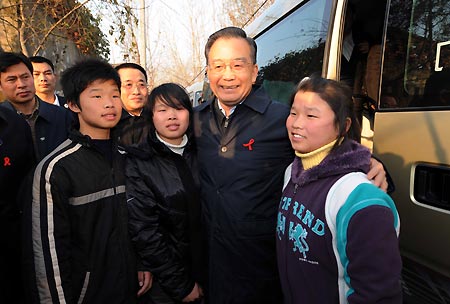
Chinese Premier Wen Jiabao (C) hugs three kids, whose
parents passed away due to HIV/AIDS, in Fuyang prefecture, east China's Anhui
Province, November 29. Wen visited people living with HIV/AIDS and workers
dealing with the disease in Fuyang over the weekend, prior to the World AIDS Day
which falls today.- Xinhua
Chinese Premier Wen Jiabao visited people living with HIV/AIDS and thanked
workers dealing with the disease in the eastern Anhui Province over the weekend.
Wen told a special symposium composed of AIDS experts and grassroots medical
workers in Funan County, that government funds for prevention and control would
increase year-by-year.
The Ministry of Health said yesterday that 264,302 people in China were
reported to contract HIV, of whom there were 77,753 AIDS patients, by the end of
September, while 34,864 people died of AIDS.
However, according to a joint estimation of the ministry, UNAIDS and WHO,
there were some 700,000 Chinese living with HIV/AIDS by the end of 2007.
Wen said anti-viral medication should be listed in the country's basic
medicine catalogue.
He went on to say AIDS control and prevention was "of vital importance" as it
was directly linked to the lives and health of the masses. Efforts should be
strengthened in high-incidence regions and within specific groups, Wen said.
"The Chinese people are proven to have the confidence, resolution and ability
to do a good job of AIDS prevention and control."
The premier stressed that various Party committees and governments should put
the AIDS issue at the top of agendas and ensure that policies really benefited
patients and their families.
DOOR-TO-DOOR VISIT
Upon his arrival in Yingzhou District, Fuyang City of Anhui on Saturday
afternoon, Wen went to the home of Huang Jinhong, a high schoolgirl whose
parents died of AIDS. Huang and her sister and brother were invited by Wen to
the Zhongnanhai, the Chinese leadership's Beijing compound, two years ago when
the premier chatted with them and inquired about their needs.
With a red ribbon on his bosom, Wen embraced the three children and inquired
about their study and life. He was very glad to see the children, together with
their grandmother in her 80s, had obtained living subsidies for families struck
by the disease.
By giving each of them a set of dictionary and a schoolbag, Wen encouraged
them to study hard and lead a meaningful life.
Fuyang's Yingzhou District has a high HIV/AIDS prevalence. The documentary
"The Blood of Yingzhou District" by Ruby Yang and Thomas Lennon, which won the
2006 Oscar for Best Documentary Short Subject, told stories of children orphaned
by AIDS in a poor village of Yingzhou.
Later, Wen went to the Dahu Village of the Funan County where HIV carriers
were in a large number. Villagers with HIV burst into tears when the premier
shake hands and talk freely with their fellows.
Wen became silent when he found a seven-year-old girl Xiao Xue was a HIV
carrier. He let the girl sit beside her and encouraged her to have faith in
life.
He asked about the implementation of national AIDS prevention and control
policies in the village and praised the local efforts that the "four frees and
one care" policy were implemented well since 2004.
The policy included providing free anti-viral drugs and treatment to poor
patients, free counseling and antibody pre-screening services, free counseling
and maternal tests for pregnant women and free tuition fees for children
orphaned by AIDS. The local government also offered living subsidies to AIDS
patients and orphans.
"If I had not taken the medication, I would not stand here today and might
have died many years ago," a middle-aged woman told the premier.
"Where there is life there is hope. We are all concerned about you. Your
priority is to receive the treatment and take the medication," Wen said. Turning
to the officials, he said various levels of Party committees and departments
should offer more aid to AIDS patients.
The premier nodded his head after learning that local food sales, farmers
working in cities as casual labors and children's schooling were not affected by
discrimination against the disease.
"AIDS patients and orphans were often considered as an underprivileged group.
We should let them get their basic life allowances and form a social trend of
caring AIDS patients through education," Wen said.
Walking into a community medical service center for AIDS patients in Funan
County, the premier shook hands with patients and asked each about their
physical conditions.
"Optimism and perseverance is vital for a patient," he said. Wen particularly
praised Cheng Xianyue, a local AIDS patient who donated 2,000 yuan (US$256)
after a massive earthquake struck southwestern Sichuan Prvovince in May.
The premier had visited AIDS patients and medical staff ahead of the World
AIDS Day on Dec. 1 or on festival occasions since he started his tenure in 2003.



